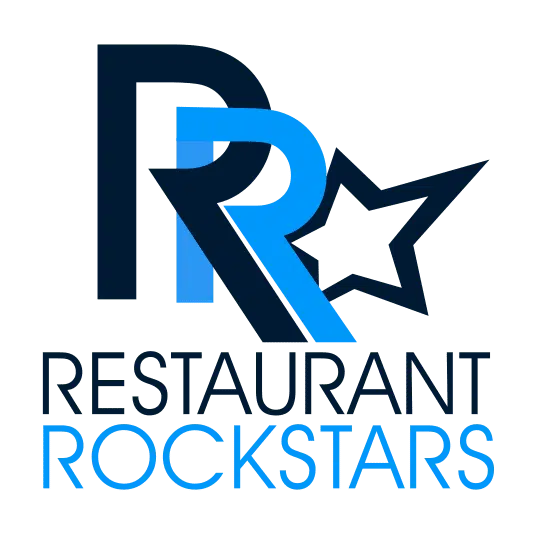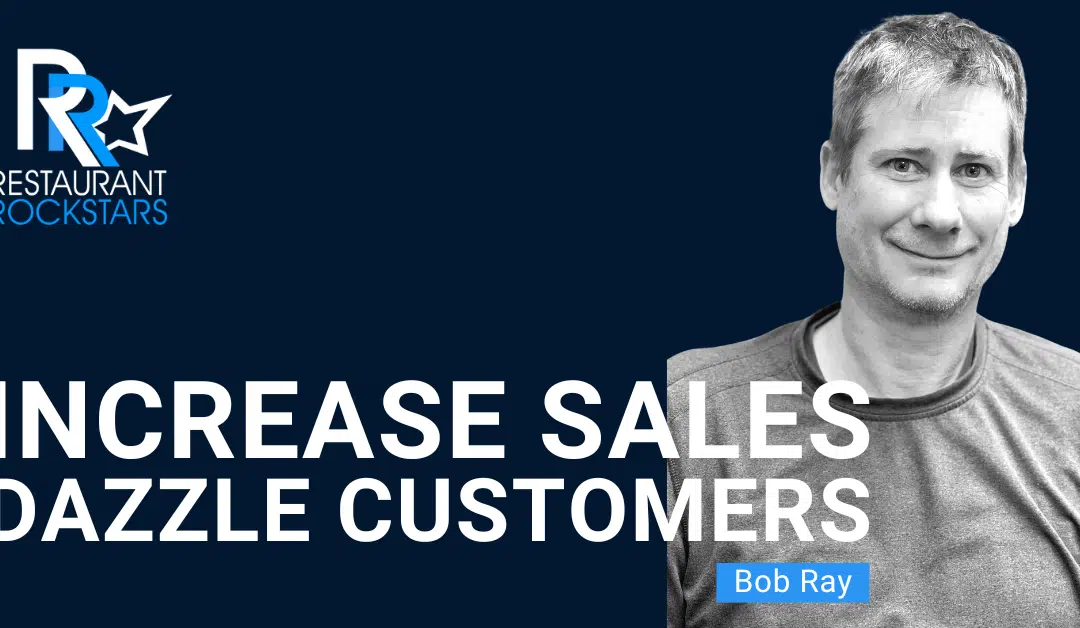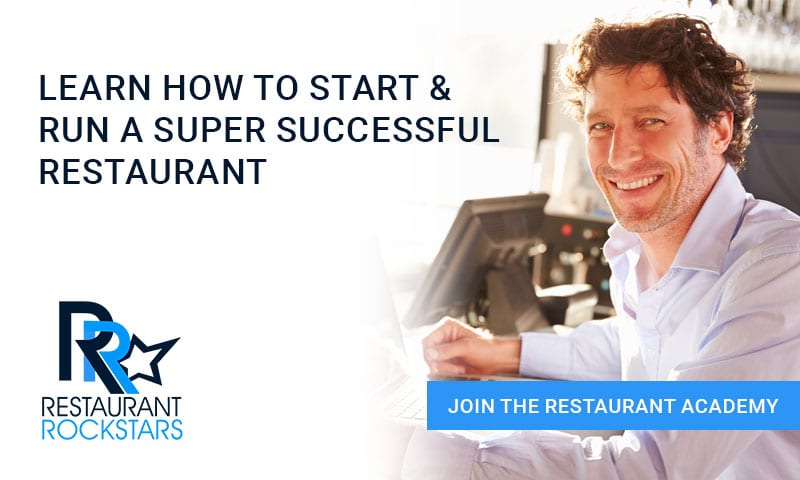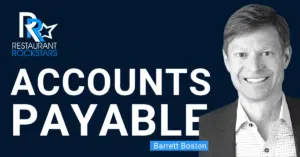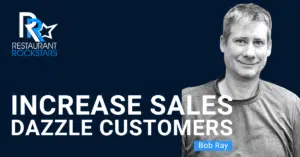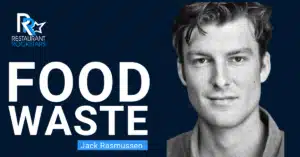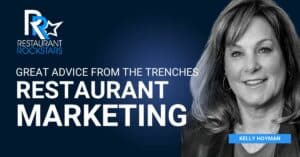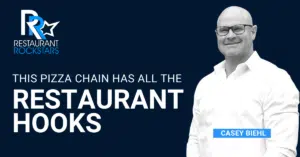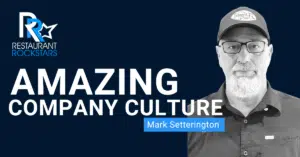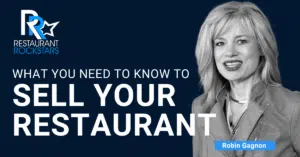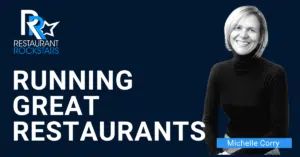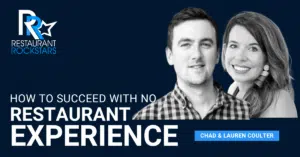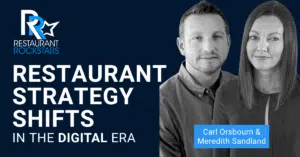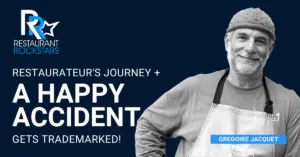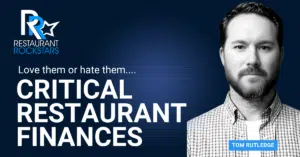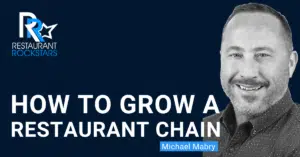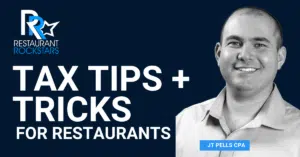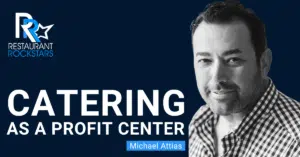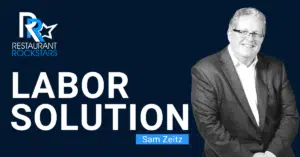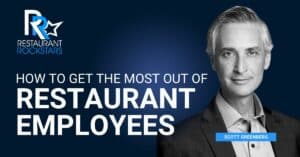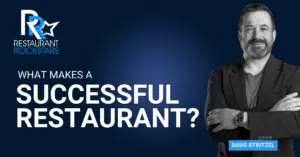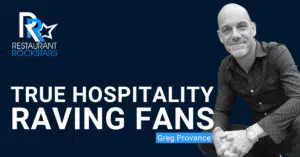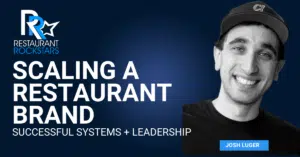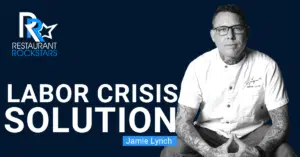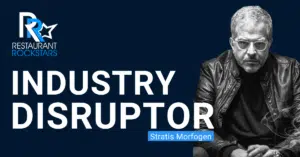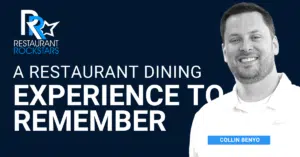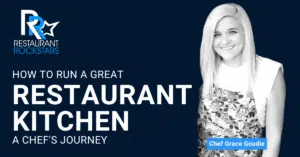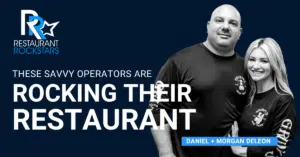Restaurant Rockstars Episode 299
How to Increase Restaurant Sales & Dazzle Customers
LISTEN HERE OR ON YOUR FAVORITE PODCAST PLAYER
Prefer to watch the interview?
Click the video below.
These are crazy times for all of us, and now more than ever it’s up to you to deliver dining experiences that WOW your guest!
Make them forget their daily routine and give them a memorable escape. This is the “key” to loyalty, repeat business and the pride that comes from making guests happy.
In this episode of the Restaurant Rockstars Podcast, I’m speaking with Bob Ray, the C.O.O. of Margaritas a 25 location Mexican concept that really knows how to dazzle its patrons. Imagine walking in the door and feeling the hospitality, sights, sounds and tastes of south of the border. You’ll really feel like you’ve just landed in Acapulco or Mazatlán.
Listen as Bob speaks to:
- How providing authentic and genuine dining experiences leads to high check averages, repeat business and glowing reviews
- Effective on-boarding, staff training and retention
- Providing staff with the tools they need to succeed and time-off to recharge
- Vital technology for convenience, productivity and enhanced guest experiences
- Management priorities and proven results
- Margarita’s proven marketing strategy
And how this restaurant group achieved 20% sales increases during multiple quarters of the pandemic and a 50% higher cash contribution YTD 2021.
Don’t miss this one, then go Rock YOUR Restaurant!
Roger
Guest 0:00
You know, across the industry, people were cutting hours, like you said, you’re cutting shifts because of staffing. But they all were closing at nine and 10. And so we, we were in law markets, we were the ones that were open. And we’ve always had a good connection with industry people. And so when they were getting out of work, and a lot of work, it’s like that. That’s our, that’s our guests base for nine that nine to one, and we would get other industry people afterward come in, they appreciate our hospitality and the quality of our product. They appreciate somebody else taking care of them, they treat our people well. So there was a synergy there some real uptick in business that we’ve been able to sustain because of the choice we made to do what was natural for us.
Sponsor 0:49
Thanks again for tuning into the podcast crazy things are happening right now with costs of gas and inflation and everything else and guests just want to escape every day. And it’s really up to us as operators to provide that escape to ride ambiance and vibe and service and food and beverage and everything that really makes them forget what’s going on in their lives. Well, this week’s guest is no exception. I’m speaking with the chief operating officer of a chain of Mexican restaurants called margaritas. And I’m actually a customer it’s one of my favorite places to go. And every time I walk in the door, it is literally transporting me to Mexico, the vibe, the music, the margaritas, the food, the service and just making you feel like you belong like you’re a regular even if you’re a first time visitor that’s really what it’s about. So I’m speaking with the Chief Operating Officer, you’re gonna learn a lot, so stay tuned to this episode and don’t miss it.
Intro/Exit 1:47
You’re tuned in to the restaurant rockstars podcast powerful ideas to rock your restaurant, here’s your host Roger Beaudoin.
Guest 2:01
Imagine both your front and back of house teams are so well trained that they’re executing flawlessly. Your front of house is doubling your sales, boosting repeat business and creating five star dining experiences. While your back of house is consistently preparing each dish to perfection on time and to spec having a restaurant this dial takes a unique trading system. That’s where serve comes in. Serve means steady restaurant variety, and it is a powerful mobile training system custom built to meet the needs of your restaurant. Serve will uplevel your team’s knowledge and skills, maximize your profits and create experiences that guests will rave about serve is the key to unlocking your restaurants hidden potential, and will prove that the more your team is able to learn the more your restaurant will earn it. And it’s a game changer. Ready to serve? Get started@servicenow.com Hey, everyone, welcome back. This is the restaurant rockstars podcast and our mission here is really to help you operators and managers and staff working in restaurants to kind of rediscover that passion of why you got into this business in the first place. So I’m really excited today I’ve got Mr. Bob Ray. He is the CEO of a big northeast brand called margaritas Mexican restaurants. Welcome to the show today, Bob.
Guest 3:22
Hey, good to be here. Thank you.
Roger Beaudoin 3:24
I’m really glad you’re here. You know, my audience doesn’t know this. But I’ve been a customer for years and margaritas and Mexican food is one of my favorite concepts. I love the vibe of a Mexican restaurant. I love to drink margaritas. I love Mexican food. And it’s just such a Festive Celebratory thing and your your chain of margaritas restaurants across the Northeast has done a particularly great job with the ambiance you know with the staff training with the feeling and you know when you walk into a margaritas you really feel like you’re in a Mexican you’re in Mexico, you’re you know, it takes you away from her every day, which is what people really want during the pandemic. So why don’t you tell us first? What’s your backstory? How did you get into this business? Um, it can go as far back as you are at 15 years old and you worked at McDonald’s or used to cook in the kitchen or maybe something entirely different but how did you get to be CEO of margaritas and what’s your kind of career trajectory? You might say?
Guest 4:18
Sure. Yeah, yeah, it starts like so many people might my first job was washing dishes, mine to a country club and then I worked at a seafood takeout place. Those are my high school jobs. Okay. Yeah. Then during during college, got an opportunity to to apply what I learned in the seafood take out that that fried food, fried, fast food kind of seafood business and run my own place with a friend of mine for a couple of summers. So it kind of continued while I was in school, it continued my connection to the industry. And when I got out, you know with a degree in political science and not really knowing What I wanted to do, there was kind of a natural progression to continue and look at management in the restaurant industry. And right out of right out of school, I met AMC Matt and met John Pelletier. And that’s where it all got started for me. I really, I really didn’t have growing up in Maine, I really didn’t have exposure to Mexican food. margaritas had been in the Portland market for a couple of years, at that point. And so I kind of learned everything that I know about Mexican food, and Mexico and the culture and the fun and the things that you mentioned in the intro, about how it’s festive, and it’s most celebration like that, that I grew up learning that and helping grow that in New England, but margaritas and it’s been just a ton of fun since then,
Roger Beaudoin 5:54
I had some early influences. And we have a lot in common because I’m, you know, you mentioned I started as a dishwasher, I started a dishwasher, believe it or not at a country club also. And this was a private club, Bob. And I think it really gave me my first introduction to hospitality. Not that I knew necessarily what that word meant at that time. I’m a senior in high school, I started off as a dishwasher, but they saw something in me. And within three months, I was promoted to a bartender, and this private club, you know, the members obviously expected really great service. But if you treated them like they were VIPs, I mean, they just threw $20 bills at you all the time. And it was amazing how much money I was making. And it was genuine service. I really liked these people, I got to be pretty friendly with a lot of them. They were regulars. They were in four or five days a week. But that was my introduction to this business and hospitality. And I quickly found out that, you know, if you deliver great service, you’re giving people really great experiences. You’re making a lot of money, what a win win. And I continued to bartend throughout college, and that was my introduction. And then in college, my first Mexican experience was on spring break, I had a fraternity president that actually is family owned a condo on the beach in Acapulco. So the half the fraternity ended up in Acapulco for spring break. And you can imagine what that was like. So again, the Mexican culture came alive. We’re drinking margaritas, you know, we’re on the beach. And it’s like, wow, this is cool. And that fueled, you know, one of my, one of my interests and Mexican culture, and I’ve been back to the country numerous times to different parts of it. So I totally get the concept. Before we get too deep into margaritas. What do you do in your spare time? Bob? Do you have passion projects are the things that you just love to do that? You know, do you play golf? Do you go Scandia hanging out with your kids? What do you do?
Guest 7:40
Yeah, yeah, it my kids are, are 10 and 12. And a lot of radiates revolves around that. But, you know, being in New England, something you mentioned before we came on, like we went skiing last week, they’re starting to get into that. And I like to hike and take advantage of the mountains. But we’re near the coast and we go to the lake in the summer and all that stuff. And then involved in their sports and try to stay connected in the community that way, because it’s a lot of fun. That that’s enough to keep me busy. You know, well, that’s awesome. Yeah.
Roger Beaudoin 8:17
Let’s let’s dive into the history of margaritas. You mentioned the name John Pelletier. So I believe he was the founder. And I think your company was founded in 1986. And it started with a single location, then it expanded. And you’ve been part of this whole growth, you know, since the beginning.
Guest 8:34
Yeah. Yeah. John started in Concord with tea wands, and the growth started, you know, he had some success and some ambition and some vision, right and negative, the Stan Bagley and open the restaurant or domain, and then it started to go from there. I joined in 1992. And they were they had just opened seventh restaurant, I think so. So and had kind of a core concept down they started making trips to Mexico, you know, that that piece that really became a part of our culture and our decor and the look and feel and and what really feeds into obviously, the hospitality is a huge part of it. But what people feel like when they come into our restaurants started to evolve, as we brought the art back and started to have the chairs made and brought back and and bring more color in the restaurants you know at that time. And, and it just started to become fun. So from when I joined and started to take on different projects, we got into a groove of kind of opening a restaurant a year for a while doing it responsibly growing with our team and promoting people from within and one of the best things about My time with margaritas was how many amazing people came through the organization because we, we think, you know, what you talked about your experience as a bartender what you learned about relationships? Well, we we know that whether somebody’s with us for six months or six years, or we have people that have been here 30 years it’s talented people who have bring their own personalities to work their own energy and attitude and want to have fun, that have made us what we are, and that make the difference every day. Absolutely. And so it’s amazing what, you know, the people that that have been a part of this, and that can look back and say, it was the best job they ever had, like people that are have amazing careers and other industries do all kinds of different things. For us that that feeling of family that happens when a margaritas is is is going the right way, when we have the great managers in place that, you know, this, this family feel it can happen in a restaurant, the connections that happen. Like that’s, that’s something that probably the most special part of how it’s been for me, and I’ve been a part of so. So it’s been a lot of fun.
Guest 11:17
Yeah, I can’t say I’ve been in a lot of different businesses. And I totally agree with you. I mean, the restaurant business is just fun. I think that’s what’s attracted people for, you know, decades into this business. And you know, you’re right. It’s like, this is a business where you don’t need a formal education. But the skills you learn the people skills, the relationship skills, the life skills can literally take you anywhere, whether you stay in this industry or not, you can start out like you and I in the dish pit, you can literally own your own chain of restaurants without a college education, you can literally learn so much if you care, to apply yourself and to learn every single day and have fun along the way. So you’re right, it is a culture of hospitality, family is super important. You know, and it’s not just the staff that feel like family in your restaurants, I think that your regular customers feel like family also. And then it’s all about fun. So hospitality, family and fun, really go together with your concept. So that’s really awesome. Let’s talk about, obviously, every restaurant was just hit sideways when the pandemic first hit. And it’s getting to be a cliche, not even talk about it. But it’s really interesting to know how really successful operations that are still running, have sort of navigated and continue to navigate, you know, the challenges. So why don’t we talk about what happened in you know, March of 2020. And what happened along the way, and margaritas has made some specific shifts with labor, and with, you know, cost of goods and all these things that are really increased sales, you know, the third quarters of 2021, compared to the third, the last three quarters of 2020 are up 20%. And you know, your contribution is up 50% year, year on year. So all this stuff is really powerful. And there’s a formula there, you made some really critical decisions. And I know you were you are part of that. So walk us through pandemic, day one. And then what’s happened since and where are you at now?
Roger Beaudoin 13:12
Yeah,
Roger Beaudoin 13:14
that’s a lot. I know. I mean, there’s so much that’s happened, but I’m trying to remember the majority of it.
Guest 13:19
Oh, very much. So it was? No, I had been that just two years ago now. Right? Yeah. So it has been that school vacation week, here. In February, I had been down, we’re just starting to hear the rumbling around COVID. I’ve been down in Florida, came back. And you know, we didn’t know quite know what was ahead, but starting to wonder how this is going to affect us. And then, you know, we like everybody got got hit with restrictions and shutdowns with one day notice starting in that third week in March. And what we what we learned right away, was we were not we had never done much business and takeout. We were, you know, maybe 2% of our business was was there. And so we went to a takeout model for a week because we had all of this product we had people were trying to figure it out, like minute to minute making decisions. And it it just didn’t work. We weren’t ready. Our guests weren’t ready for that everybody kind of went into lockdown. So we shut the restaurants down completely. And and then started to reopen in May after we had some time to strategize. Yeah, get a feel for what it was going to take to make it. Because I mean, that was the feeling at that point. We didn’t know if we were going to exist. I think a lot of people went through that, that stress in that in that feeling. So we decided we had a lot of a lot of long days and a lot of conversations and decided and do things a little differently coming coming into the reopening some out of necessity in some, some out of short term necessity in some, based on reflection on what really made margaritas successful. And in that origination where John started, where we grew in the 90s, it was all around one show a day, we would open at four o’clock, we’d do dinner, we had these concepts. I mean, you’ve been in the restaurants we generally have, what would be considered big restaurants. Oh, they are for sure, man that benefited us through this as well. But yeah, yeah, we have a dining room, we have a bar and language, we have two concepts going in one really, which has been great, because we really liked the fifth Focus on the Family Business do a great job there. But we also like throw the party. So that that’s how this whole concept grew. And then over time, a lot of lunch got added in focus on that, you know, to increase sales. In some places that worked well and others, it was a little soft. But what we decided was, with all the uncertainty, we wanted to do a couple of things to help with our focus in our unit economics. And we trim the menu. Because over the course of 2530 years, you have a lot of really good ideas. And then you want to have the running the specials you want on the menu and the menu creep had really, I mean, it was all good, I guess love it, but a lot of work because we’re a scratch kitchen. So we decided we were going to really focus the menu. And we’re going to focus our operations, we open just for evenings, and we didn’t open on Mondays.
Guest 16:47
And now that, you know, didn’t know how important that would be. But that’s been a huge part of our success. The other the other part was, you know, in the workforce, there was a lot of uncertainty. But people coming back to where there was this conflict of interest around the unemployment payments and everything else challenges. But we had one of the other real benefits that worked to our advantage was our amazing managers and the connections that they had with their teams. And we had, you know, in most of our markets, we had these managers that had people that couldn’t wait to get back together, get back to work and take this on. And it wasn’t everybody. But we have this amazing core that came back, you know, and faced all the adversity of mask mandates and confused guests and the challenges of, you know, sick co workers and everything that went on through the course of the last two years. But they were just dying to do it together. And so we focusing our hours, bringing our best people back, having them not have to work these long days and just focused posting, focusing them on the times where they made the most money. And we were the most profitable, we found it a little bit of a different formula, which for me is kind of like the old formula. This is something we already knew. And when we built our success, and it’s been pretty impactful in our success, our financial success, our quality of life, and we’ve seen, well, it’s a little hard to quantify, we feel like one of the things about the margaritas experience is, you know, you feel like you’re you’re going on vacation without getting on plane like you can get away. We people celebrate with us a lot. But people do crave that. And if they want to come on a Monday and we were an open it really looks like you know, that would translate into it might not be Tuesday, but another visit maybe they haven’t been in three weeks and then come on Friday night or the following week. And so we don’t feel like we with with restricting the hours we gave up a lot of that loyal, you know, the sales that come with those loyal customers. So there’s a lot there. But that was that was kind of that’s how we restarted and what our approach was, is we reopened the restaurants one or two a week through that summer, and obviously faced all those challenges that everybody else did, with staffing and in uncertainty but it’s been it’s been a pretty good ride considering
Sponsor 19:34
not answering your phone is one of the quickest ways for your restaurant to lose a potential customer but between serving in person customers and dealing with the kitchen, it’s hard for staff to prioritize incoming calls. That’s why your restaurant needs popmenu answering simple questions that keep your phone line tied up can be handled without pulling a staff person from your in person hospitality. Reclaim the power of your phone. Popmenu answering is powered by Artificial Intelligence to answer the simple questions most people call in with like, do you have outdoor seating or what are your hours within the popmenu platform you can customize answers for your restaurant and choose the voice your guests here. Plus create customized greetings. Popmenu answering picks up your phone 24/7 365 days a year turning every phone call into an opportunity. Plus popmenus full collection of tools helps optimize your restaurants website and menu streamlines your ordering experience and assist in retargeting to enable you to build long lasting relationships with your guests get help answering your restaurants calls now with popmenu answering. And for a limited time, my listeners can get $100 off their first month plus an unchanging monthly rate at popmenu.com/rockstars Go now to get $100 off your first month at popmenu.com/rockstars
Roger Beaudoin 20:59
You’re talking about so many critical things that operators have been through right now. You know, we’re talking about shutting down Dayparts because Okay, when the pandemic started a sort of fade away, business started coming back to restaurants and it is literally booming right now across the country. But yet the labor crisis has forced a lot of restaurants to close day parts, close days, they can’t serve the customer. And it’s all about okay, making as much money as possible right now while continuing to deliver, you know, the hospitality that your guests have come to expect. And now that’s one of the biggest challenges operators are going through. And pre pandemic, you know, there wasn’t a lot of financial savvy, you know, with with many operators out there, it’s like they thought or the mindset is you’ve got to be open seven days a week, because you never know when your regulars are going to come in. But therein lies the power of a brand, okay? Because margaritas is a very powerful brand. And customers know it and they’re willing to sort of work around the decisions you make, and they’re still going to come in because they appreciate the experience. We talked about how authentic your brand is, and how you’ve gone. You know, there’s been so many trips to Mexico to source authentic furniture, authentic artwork and the colors, it’s like it literally brings Mexico to the guests, they appreciate that I would call that a competitive advantage, I would call that a hook. And now there are operators out there that are trying to make money, they’re still struggling to be competitive, when everybody is literally booming, yet we can’t serve the public. But yet now our staffs are burned out too. Because with, you know, the mass exodus from this industry that everyone’s talking about, so many people have left this restaurant, business and so many good people are gone. It’s like, you know, operators are just shell shocked, and they’re just tired, and they’re burnt out. And their staffs are burned out. Because as people have left, other people have had to pick up the slack. It’s like it’s really been a perfect storm in the business. And somehow you’ve had those challenges that you found unique ways of sort of sidestepping those challenges, you’ve kept your people motivated, the morale is high. You know, I think you’ve come up with new benefit plans and competitive wages, which we’ve all had to do, obviously, and you’ve made your restaurants more profitable, which is something that I really want to be clear to the audience. You know, it really is about profits. It’s about dialing in every penny on menu design. And you talked about paring down the menu. But I also understand you’ve crossed utilize like, it’s very important to cross utilize ingredients on a restaurant menu so that there’s not a waste to spoilage problem, all that kind of stuff. And to really simplify. And you’ve you’ve given us all these ideas. So I’m hoping all this comes clear to the audience. Let’s talk about morale. Now. You’ve got a family, you’ve got a core group of employees. Are there any specific recognition rewards programs, I mean, you’ve promoted with from within, which is super important. You’ve given people management responsibilities, you’ve recognized talent, all of this is really important to build an organization and to build a brand. What is margaritas do special if we could start with, you know, maybe your training programs with your staff and how you develop your people and the experiences that you want to deliver to the guest. And we’re how the whole thing ties together. And I know there’s a lot of key nuggets in there for our audience and our listeners.
Guest 24:25
Yeah. Probably the we have a pretty good training program. And it starts with having having great teams that attract great coworkers and you know, you often find good new people from the people that work with you. And so there’s, once you get some momentum there, it becomes easier to be the employer of choice and so on. The thing that makes our you know, talk about are on the front line with our servers and our bartenders The thing that tends to make them most successful is the margarita. And you know we are having amazing success selling margaritas at levels beyond we ever had before. And that’s it’s a primary focus for us and always has been we’ve always talked about it, but there were, our teams are doing a better job. It’s so simple we get people to have Margarita with their experience, you know, we do a pretty good job with it. We have a lot of different flavors and, and recipes. So people have something to choose from, and they tend to have our guests tend to have a better comment. And they have a little tequila.
Roger Beaudoin 25:40
Yeah, right. Yeah, that’s that is definitely part of that whole experience having a margarita that tequila just it’s all part of the experience. It’s such a part of the Mexican culture, obviously, you know, and margaritas, just go with a Mexican restaurant, I can’t imagine having a Mexican meal without a margarita, and even having one before dinner gets there. Yeah, it’s all part
Guest 25:59
of it. Right. And so before dinner gets there, so I focus on being great at executing that piece. But the speed speed of service is is key. And efficiency is where we are facing staffing challenges like everybody else, and often doing more with less. And, and, you know, we’ve made some technology changes to try and try and support that and try to keep our focus clear on what matters for our teams and not not do too much from an operational perspective. Other than, you know, we need to be clean, we need to have, you know, our food has to be hot and correct and on time, and we need to deliver on the experience. But this focus on, get a margarita order, get them their beverages quickly. We we shift, we switched POS platforms last the end of last year and got over toast and we’re working on handhelds and for speeding things up that way. I’m focusing on supporting our bartenders so they can be really locked in because not only are they taking care of the bar top but but they need to be in the well to turn around the drink orders for the for the servers quickly, this whole focus on getting them getting that first round of drinks there quickly. So once you get that first piece of service, that’s when you relax is against well then you know you don’t you you have this uncertainty, but whether how you’re going to be taken care of. So selling margaritas having our people you know having friendly people who care about you know, hospitality and and relationships and engagement and throwing the party. Because every every party is there for a different reason. But a lots are there to celebrate or get away from things. It’s it’s pretty simple. But it’s it’s hard to do unless you can eliminate the noise and distractions and stress. And there’s a lot of that in the world right now. So we’re constantly working on it tracks back through everything supply chain has been a big disrupter right? Where we forever had these very high standards around ingredients and and that we wouldn’t be out of things right that we were lucky to be a company that has the money in the bank to always buy what they need to put it on the shelf to serve the guests, right? A lot of small operators have to make choices week to week, correct. What, why. And so we have these very high standards of never out of anything, you know, figure it out. That’s not how we’ve lived the last year and a half. And we’ve all had to deal with it, because we’re going to do our best. But most importantly, what we do deliver to our guests is going to be is going to be of high quality. And his good may not be everything that’s always been on the menu, but we’re going to do our best.
Roger Beaudoin 29:01
Now that’s interesting that you’ve taken a stance because you mentioned scratch made kitchen, which clearly stands for quality. And then we’re also talking about not being afraid to spend to get what we need to serve the customer. So we’re not out of the things even though we’ve pared our menu down, I know that your restaurants are sourcing locally as much as possible. And that has been sort of a key to obviously having the goods when you need to sell the goods. That’s great. We also talked a lot about you know, profitability, and I know you’ve cut lunch, is that an ongoing strategy will lunch be done or just for the immediate future or that’s remains to be seen? What’s what’s happening there
Guest 29:40
remains to be seen, but where we are in lunch right now is we do have in four of our locations. We have lunch on Saturday and Sunday. Okay. And and we do in those locations we do very well. But I think we’ve set a higher threshold for what success looks like, you know in order To want to bring our people in, in the AM, when we do a lot of pm business on Friday and Saturday night. We need to be able to build the staff and have it be, you know, they need to make money we need, we need it to work for everybody. And so we do think that that we can launch has real potential, maybe the idea of, you know, bringing a brunch focus at some point, because that fits pretty well with our concept if we could, if we could get it just right. You know, I think I think the important driver is you think about where lunch was, you know, weekday lunch for margaritas over the years. It still often involved a margarita. I mean, it’s shockingly the last time I looked at those, those weekday lunch, the food and beverage mix. We were still at 35%. Alcohol on Tuesday, on Wednesday. So it tells you why people are coming in there. Our business has never been the fast lunch, the lunch, our lunch. And so as we look at getting back into it, we have to consider that and where there’s enough enough business to make it worth our people’s effort.
Roger Beaudoin 31:23
Your concept has been somewhat pandemic proof in that it was geared toward this whole feeling of celebration. And, you know, people escaping there every day, you know, Everyone’s tired of this COVID thing. And it’s like they’re tired of being shut in. They’re tighter restrictions, they just want you know, the mask fights across the country have been ridiculous. But it’s like your concept lends itself to an escape. And I’m also hearing that, you know, you’ve really focused your day parts on what is most profitable, you’ve analyzed your business model, you’ve analyzed reports, you look at things store, by store, and you clearly make decisions based on trends that are, you know, very clear, and concise. And that has led you to focus on more late night now. So dinner has always been the big thing. But now you’ve got late night. But earlier, you also talked about getting that first drink and write immediately because that lets people relax. And obviously selling alcohol is highly profitable. You want to sell as many drinks as you can without over serving people, of course, but one Margarita early immediately within being sat, you know, within 510 minutes is great, but it probably leads to another Margarita. Whereas if you got your margarita when you got your dinner, that might be it. So you know, the service and the efficiency and the productivity all lends to profitability and a better guest experience. So I’m hearing that you’re doing that particularly well. Let’s talk about late night did that just sort of naturally evolved? And is there live music or entertainment that keeps people after dinner? Or getting people to come in? Maybe just to have appetizers with their margaritas? A late night experience? Tell us about the late night experience?
Guest 33:02
Yeah, it’s not entertainment driven. It it is vibe driven, though. Yeah. And, and we are a place where people do come just to have drinks. You know, it’s not just about dinner appetizers. I think this is this is something for those of us that have been around around the concept for a long time, it’s easy to picture that we’d have the coolest bar in town. Like it’s in the best bartenders like that’s always the key. We have amazing bartenders. You know, often larger than life, big personalities want to be the show, and they’ll make you the best drink and then they’ll tell you about it. Right. It’s that’s part of really what what can make it special. But what happened with coming, shifting back to adding late night hours were placed in places where we had taken them away over the years. Part of part of why we got a jumpstart on it is because, you know, across the industry, people were cutting hours, like you said, cutting shifts because of staffing. But they all were closing at nine and 10. And so we we were the inland markets, we were the ones that were open. And we’ve always had a good connection with industry people. And so when they were getting out of work in a lot of markets like that’s, that’s our that’s our guests base for nine to nine to one. And we would get other industry people afterward come in, they appreciate our hospitality and the quality of our product. They appreciate somebody else taking care of them, they treat our people well. And so there was a synergy there that we feel like there’s a lot of luck involved with how things go. And we kind of lucked into that first summer and 2020 some real uptick in business that we’ve been able to sustain because of the choice We made to do what was natural for us. So that’s a, that’s a big part of the success. The other thing that I didn’t mention before we mentioned, maybe it was before we started about our big restaurants. And when capacity restrictions came down, so you take a 325 seat restaurant, and at half capacity, we already knew that we could do it with smaller restaurants like looking to the future. But this just solidified that for us that at half capacity, we were, we were able to put through our full volume. That’s amazing. In a lot of cases, we had a lot a lot of, you know, we were doing similar dinner sales, now, we would get a much bigger part of it through takeout sales, and it will always come at once and we will see some different challenges in the kitchen. Through all of this and still continue to some things we still need to solve. But yeah, we this just had some things that worked out well for us through this time and, and put us on track and to be able to continue to be successful.
Roger Beaudoin 36:13
So the state of Maine had this whole you can take cocktails package to go thing which really helped a lot of restaurants. Were you doing that with margaritas? Yeah. Are you still able to do that in certain states?
Guest 36:24
Yeah, yeah, they’ve extended extended that program and in, in Massachusetts, Connecticut and in inmate.
Roger Beaudoin 36:33
That’s, that’s terrific. That’s been that’s been very helpful.
Sponsor 36:36
restaurant owners and managers, I call this the business of 1000 details. And you’ve got more important things to worry about than calculating and paying your monthly sales tax on time. Well, that’s what Davo comes in. Davo puts sales tax on autopilot for restaurants. davo uses sales tax data from your point of sale system to set aside the exact amount of sales tax you collect every single day, and then files it and pays it when it’s due on time for your restaurant every month. Davo takes just five minutes to set up. And once it’s up and running, you never have to worry about paying sales tax again, Dacvo costs 49.99 per POS connection per month, and your restaurant can try Davo for the first 30 days free davo was created by a successful restaurant chef and owner who knows what’s important for your operation. Time is money, and you’ve got more important things to focus on, like pleasing your guests. You can’t put a price on peace of mind, why not try Davo for the first 30 days at Davosalestax.com.
Roger Beaudoin 37:39
Now, technology also played a big part in you know, your pandemic successes. Have you brought in new technology, because online ordering before was not a big thing. And now it’s a necessity. You know, and that’s just one piece of technology. And you’re probably utilizing that because you had to shift to a lot of takeout which became a new sort of opportunity and revenue stream when the restrictions happened. What technology is really game changing for margaritas
Guest 38:04
right now? Well, it started in September of 2020, we realized this thing wasn’t going away. And we were going to lose all of our outdoor seating within a couple of months. And we didn’t have an online ordering platform. We were doing some work with third parties. But in a month, we put together a platform, added some family dining options and some taken bake options and developed some additional menu geared towards that and rolled it out. And our people just got it done. It was. So I mentioned earlier, we were probably at 2% takeout. And then that winter we were we got up to 20% which doesn’t compare to everybody else. But it was a lot for us. And I think that the other way to look at that is we managed to continue to have a lot of loyal dine in business even even through the worst of this, you know where we were allowed to we obviously ran into a lot of restrictions. But so that was our first realization of looking ahead to the first comp winter. We got that done. And over the course of this past year, we took a look at our entire technology pro platform. And we switched to toast which has helped us we are just finishing up implementation of Olo which consolidates the online ordering for us and we had a couple of logjams that developed with takeout one was at the host stand because we were taking everything through tablets and during the POS ourselves packing, delivering, there was Labor pressure there talent, pressure and just a lot of activity. So all that was helped us with that that’s going to be much better moving forward. and eventually
Roger Beaudoin 40:01
does that sort of integrate with toast, and it’s all streamline now, whereas you had these tablets and duplication of effort and labor was frustrated and all that kind of stuff and the customer inconvenience that times, I’m sure. But now this whole thing is like seamless and integrated. I’m hearing is that correct?
Guest 40:18
Much better. Yeah. And awesome in mistakes, the human error, and this, so we’re in a much better spot with that we are developing. We’re working on a new app. And we’ll have online ordering through that by the middle of the year. And you know, this. So those things all help toast toast is really helping us with speed of service. Yeah, yeah, the technology is playing a big role. And we do believe that there are still challenges in hiring, we do believe we’ll be an employer of choice and that people are going to love to work for us. And we’ll be okay. But we feel the pressure like everybody, so anything we can do to make it easier on the front line, you know, we’re taking a look at it.
Roger Beaudoin 41:06
Gotcha. That’s very cool. Let’s talk about marketing, pre pandemic. And now has your marketing plan shifted, before the pandemic hit now? What is the marketing strategy? And what really works for margaritas? And is it kind of on autopilot? Does it constantly shift? I mean, obviously, certain things really work in the past, maybe new things work now. It’s like social media has taken over as you know, really cost effective marketing. But what’s what’s margaritas strategy
Guest 41:35
we we’ve been doing, we have a pretty consistent social media plan. And that’s, you know, that’s a lot of how we’re getting the word out, we have a good a good database of loyal customers. So we do have email marketing. As far as what we’re focusing on, we we love to throw parties, and one of the things that’s that we feel like we, we really can lean into, especially with this free focus on staying open late, is, we just need, we just need a reason. And people just need a reason. They just need a reason to come and have a margarita and be around other people. And so we get it been a while since we had done a Fat Tuesday promotion, you know, and it was, it was not over the top. But you know, we’re this Tuesday, we’re selling hurricanes, and we have beads and anybody that wants to come in and let loose with us. We’re up for it. Absolutely. You know, last year, we St. Patrick’s Day, we had a lot of success, all we did is a special drink and promote the fact that we’re people know, we’re a great place to hang out. And we feel like we can show people a good time for any reason. So our marketing, a lot of that we do push that all through social and but a lot of that is it happens right on the front line with our people inviting people to come see us on these days. Like that’s, that’s where a lot of the magic happens. It’s the relationships, the fact that our guests, like our servers, and bartenders and want to come see you. So, but overall marketing, you know, we are, we are developing strategies to have more targeted loyalty marketing. That’s, that’s a big piece of this year. One of the things that we had to back off of or felt felt like it was we made the choice to back off of was, we had done a lot of community work, a lot of fundraisers, community events, and so on pre pandemic. And we want to get back to that and have felt like, spring of this year was the time to start to reengage there. And you know, if you go back, you know, prior to this winter, there are a lot of families that I think weren’t going out for dining and and we expect them to start to come back. And that’s a big part of our business. And one of one of the things you know, that we were really good at pre pandemic was this community engagement and through local store marketing, doing fundraisers and being involved in in all of that it’s kind of been on on hold since we reopened. We’ve done a little bit but one of our one of our areas of focus for marketing and targets coming into spring this year is to reengage there, we feel like a lot of a lot of family business hasn’t come back to nine in since this all started and our hope and expectation is that more of that will be happening. Whether it’s you know, with case counts going down the nice weather or just this progression of this whole situation. We expect that that’s an area that we can focus on and start to do do more business with families in the communities starting starting now? Because the weather gets nicer.
Roger Beaudoin 45:07
Yeah. And then the outdoor, you know, the outdoor dining will come back and all those things and things will be back to normal soon. I can totally see that. So let’s Let’s all hope and we have an eye towards that future.
Guest 45:19
Yeah. hope hope. I don’t know what normal is. But yes, something something is good. There are good times ahead.
Roger Beaudoin 45:24
Well, that’s what it’s all about. You know, food is the universal language that brings us all together. You know, that’s, that’s wonderful. And margaritas is certainly doing great things in the business. So thanks so much for being a guest on the podcast, Bob.
Guest 45:37
Yeah, no, it’s fun talking to you. Thank you, Roger.
Roger Beaudoin 45:39
And thank you so much to our audience for tuning in. That was the restaurant rockstars podcast, and we can’t wait to see you in the next episode. Stay well, everyone. Thanks, Bob. And I feel like going out for a margarita and some great Mexican food. And the vibe of course, you guys are doing great things out there. So thanks for being a great guest on the podcast. If you haven’t already, head on over to restaurant rockstars.com I am absolutely giving away something that can transform your business. It’s called three ways you are killing your restaurant profits absolutely free, check it out. It can transform and improve your operation from a profit standpoint. I’d like to thank the sponsors of this week’s episode, popmenu, Davo, and the SRV restaurant training app. And thanks to our audience for staying with us for enjoying what you’re doing for the positive comments you send our way. And we really appreciate you listening. So we’ll see in the next episode.
Intro/Exit 46:35
Thanks for listening to the restaurant rockstars podcast for lots of great resources, head over to restaurant rockstars.com See you next time.
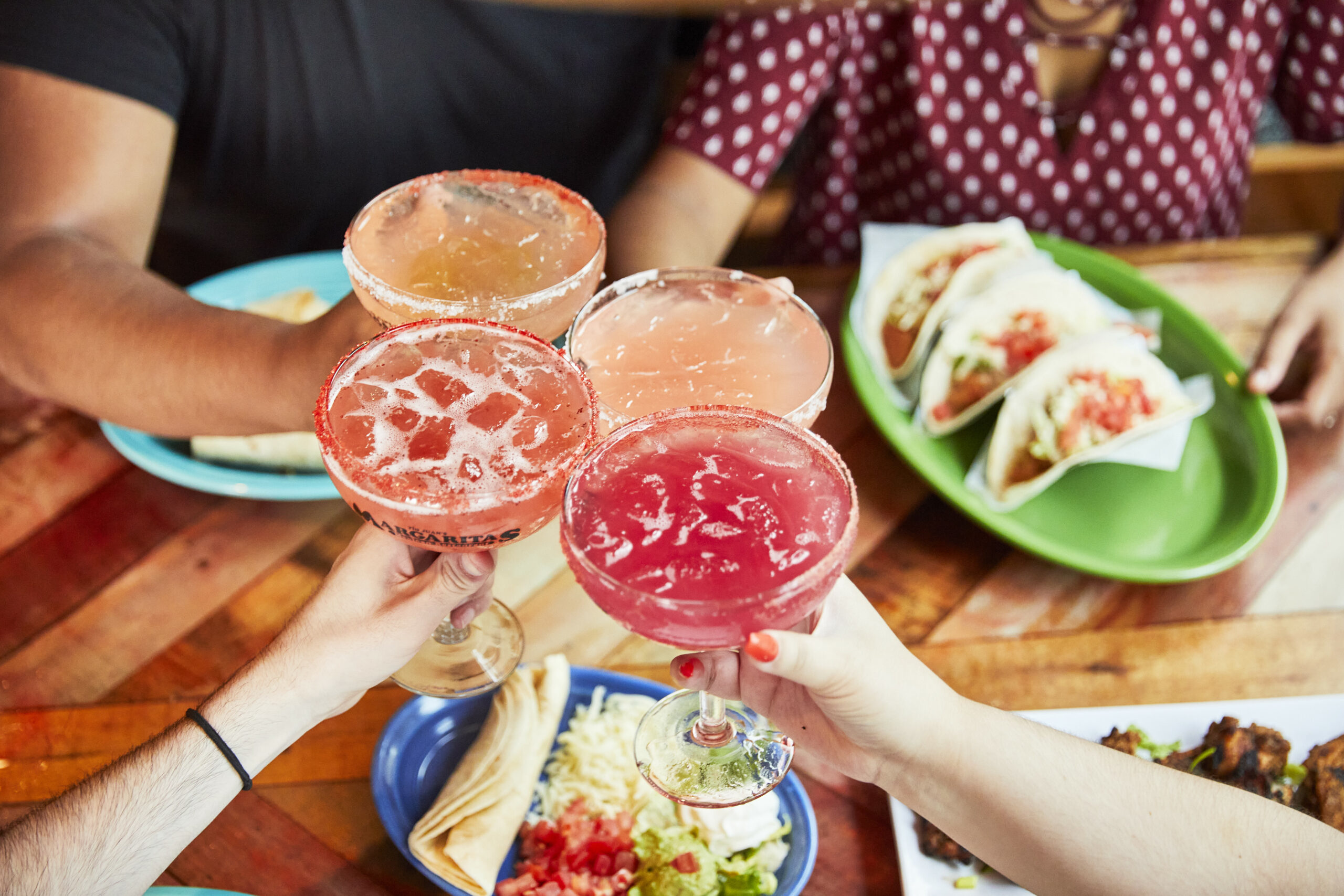
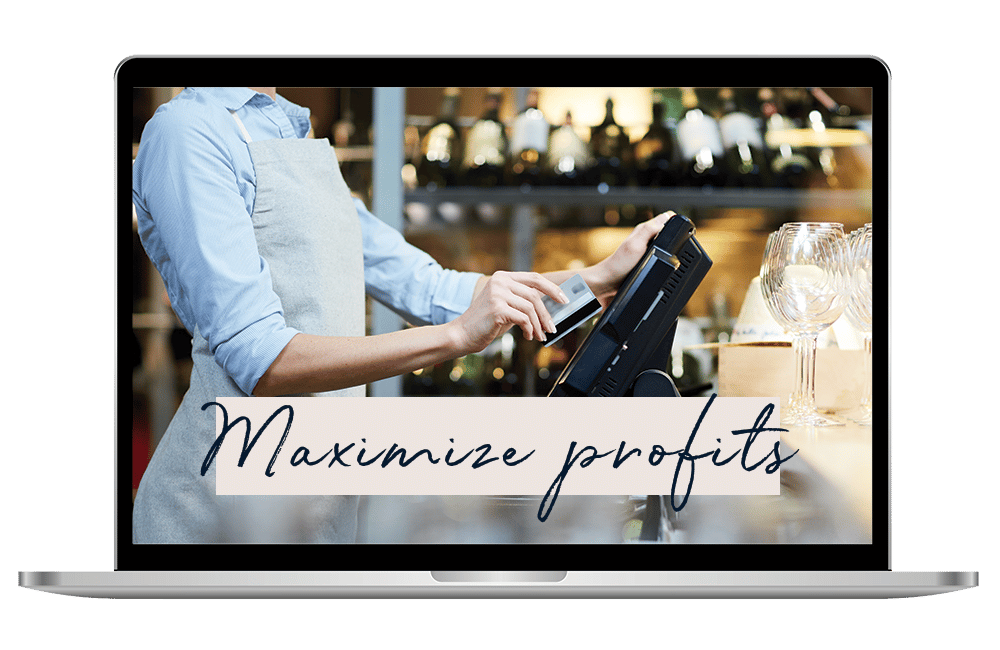
The three costly mistakes you could unknowingly be making?
Find out in this FREE guide and restaurant assessment specifically designed to reveal the unexpected hurdles standing between you and exponential business growth.
Thank You To Our Sponsors
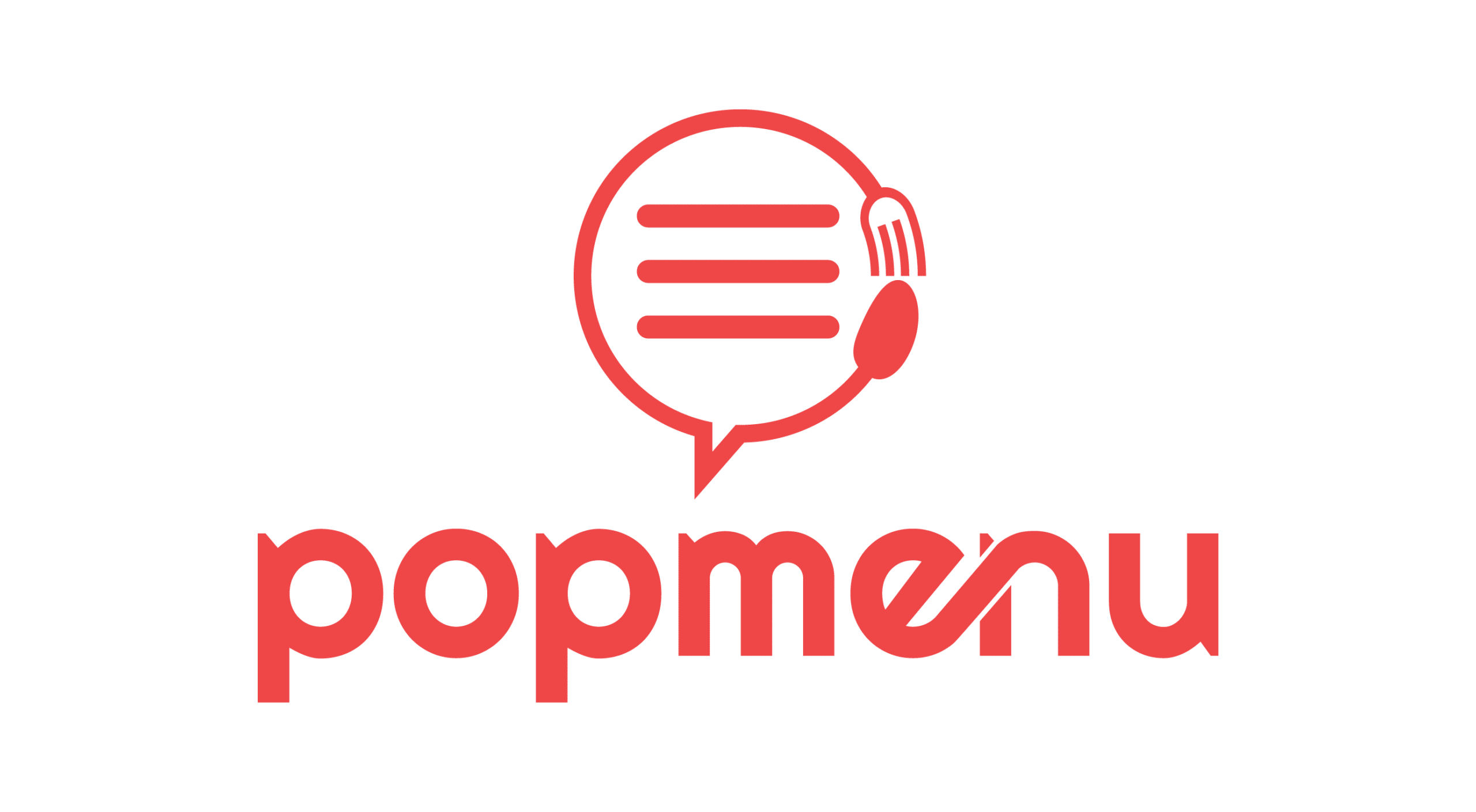
For a limited time only, popmenu is offering our listeners $100 off your first month plus an unchanging lifetime rate.
Request a demo.

Automate Your Sales Tax. Why Not Try Davo FREE for 30 Days.
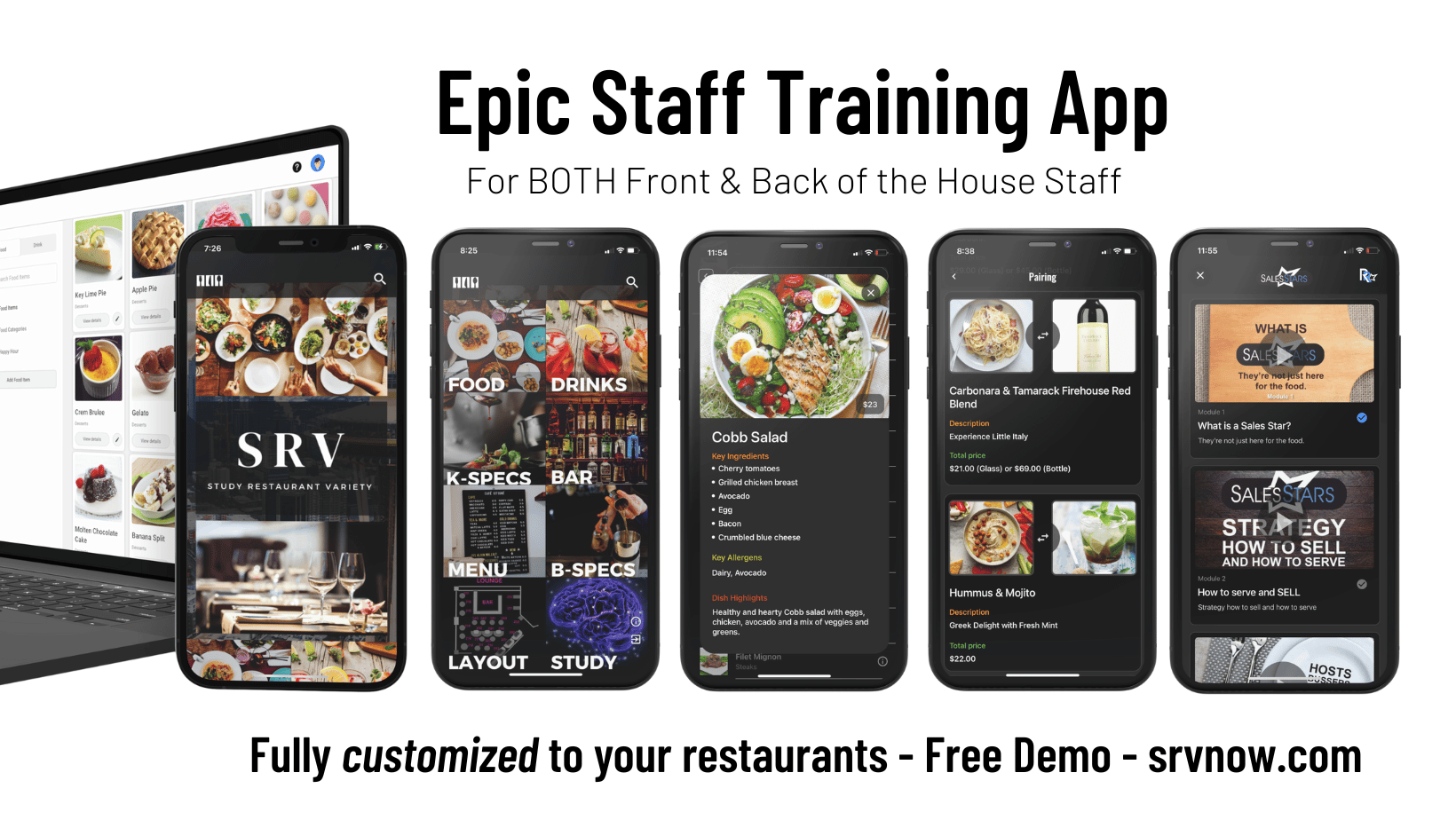
SRV teaches your team to profitably sell and accurately create the food and drinks at your restaurant.
Unlock Staff Potential and Maximize Sales
Want to become a podcast sponsor?
Please get in touch with Roger at roger@restaurantrockstars.com
